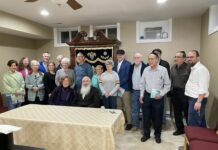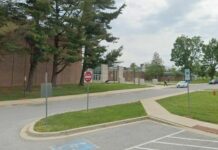
In the months following the events of Oct. 7, many Jewish community members have felt an increased sense of unity as Jewish people from across the world have come together to process their grief and show support for one another. But there is still a need for interfaith collaboration, especially during this difficult time for both Jewish people with connections to Israel and Muslims and Christians who have connections to Gaza and the West Bank.
Interfaith work has always been important, as religious professionals work to build bridges across the ideological differences of their respective religions. This work has become even more important following Oct. 7, said Lee Sherman, board president of the Institute for Islamic, Christian and Jewish Studies and executive director of Har Sinai-Oheb Shalom Congregation.
ICJS’s work largely revolves around creating ways for people across different religions, from religious leaders to religious school students, to have cross-denominational conversations and develop a better understanding of each other. Sherman was first invited to participate in the organization’s leadership group 20 years ago. At that time, ICJS only facilitated programs that focused on Jewish and Christian relationships. Eight years ago, though, the organization welcomed Muslim members into its ranks and started involving their religion in its programming.
“My involvement has always been as a participant in programs and classes, and more recently as a board member,” he explained. “There’s always a multifaith presence, with scholars and teachers from more than one religion, unless it’s a class focused on one particular belief system. There are lots of participants across the religious spectrum, and that hasn’t changed since Oct. 7.”
Still, the Israel-Hamas war has been challenging for people working toward inter-religious solidarity. It could be difficult to find factual information about what was happening, and discussion both offline and on social media could quickly turn inflammatory regardless of what was being discussed.
It was a struggle for ICJS, which focuses on deepening people’s understanding of other religions through open communication.
“One of the things we’re good at is developing guidelines for constructive dialogue, as opposed to debate,” Sherman said. “In a debate, you want to be the winner, you want your set of beliefs to win out over the other side. In a dialogue, you respect the others’ set of opinions. You don’t necessarily need to convince them, but you want to have a better understanding of them at the end of the day.”
Sherman also noted that his fellow board members and ICJS professionals have been very supportive of him and other Jewish board members during this time, as well as the board’s one Palestinian member. He recalled being sent a lot of supportive emails during the immediate aftermath of the Oct. 7 attack.
In recent times, local schools have reached out to ICJS about how they should cover Middle Eastern affairs in class. ICJS has a teachers fellowship program with a presence in more than a dozen different Baltimore-area schools, so it has been able to help these educators develop an approach to discussing current events with students.
“Being in conversation with others and being willing to communicate is critical,” Sherman said. “Because we will emerge from the conflict, and we’ll have to think about what that means going forward for building stronger interfaith communities.”
There have also been new interfaith efforts that have emerged following Oct. 7. On Nov. 15, 2023, Codetta Bake Shop owner Sumayya Bilal and graduate student Rebekka Paisner hosted “Visions of Peace: A Night of Healing,” an event designed to provide healing in the wake of the tragedy through yoga, bodywork and craft-making, as well as inter-community dialogues between Jewish, Christian and Muslim attendees.
While intended as a one-time thing, the night proved so popular that Paisner and Bilal have since hosted subsequent events. They are currently planning an iftar dinner (the meal that people observing Ramadan eat after sunset) to be held at Beth Am in order to encourage more interfaith engagement.
Paisner, whose mother is Israeli and was hospitalized for minor injuries sustained on Oct. 7, said she reached out to Bilal, her longtime friend, out of a desire to do something about the tension that was building.
“What we desperately needed was for all of us to come together, because I saw how siloed people were becoming and wanted to offer healing,” she said. “Everyone was in pain, so I felt like I had to do something.”
Not all of the reception to Visions of Peace’s work has been warm, though — Bilal mentioned that she has recently received fake negative reviews on her business due to her involvement in the programming. Still, she views her continued involvement as important.
“I grew up in a family where interfaith interactions were encouraged and sought-after by my parents. We were very worldly kids,” she noted. “So I don’t really think of anyone’s race or religion as being a barrier to forming connections.”
Paisner and Bilal hope to continue their work in the long term, and to have more Palestinian representation at Visions of Peace events, as they have been hesitant when it comes to getting involved.
“This is more of a long-term effort than it is a response to Oct. 7,” Paisner said. “This is about doing actionable sense to bring our communities together in the future, in lasting ways.”







